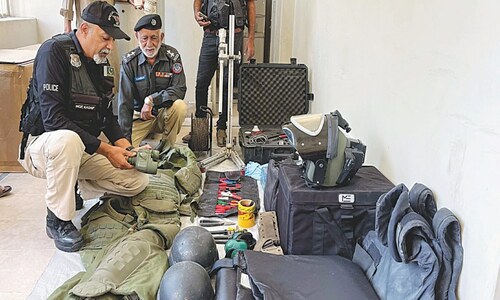KARACHI, July 6: The nexus between the clergy and feudal is hampering the growth of peace and harmony in South Asia, said Prof Ram Puniyani, a visiting scholar from India, on Friday.
He was speaking at a seminar ‘Secular Values in South Asia: Are there lessons from the European experience?’ held at the Area Study Centre for Europe, the University of Karachi.
ASCE Director Dr Moonis Ahmar presided over the seminar.
A bio-medical engineer who turned into a peace activist later in life, Prof Puniyani was also a part of the Indian People’s Tribunal that investigated the human right violations, particularly towards the Christian minority, in Orissa and Madhya Pradesh.
In a talk that lasted around 45 minutes, he gave a riveting rundown of how secularism changed the course of the western world and why the subcontinent was unable to tap the potential it offered.
In his opening remarks, he described how secularism has turned into a pejorative term in the past 50 years in the sub-continent.
“Rational thinking is not new. There was Charvek (C#arv#aka) that was there for long that allowed people to question,” he said as he went on to explain significance of secularism.
“The notion, that pope is a link between god and the people and hence unquestionable, was challenged and so were the misconceptions,” he said.
Similarly he broke down the caste and class systems in Europe based on religion (Presbyterian, Methodist), in Hinduism (Brahamins, Dalits, etc) and Islam (Arabi, Ajami) and showed how similar the role of men of religion was in all three when it came to oppressing the masses.
“Liberation of serfs, women and society from the grips of clergy led to change,” said Dr Puniyani.
“The church, the bishop the pope were controlling and exploiting the society. Liberation from the clutches of the feudal and clergy is what appealed to the French back then. Even now, women and minorities remain the biggest driving force behind secular movement,” he noted.
In the present situation, he said that the Indian religious zealots were trying to curb down on personal freedoms.
“In 1992, when Babri mosque was demolished, I thought that this is not about casts and religion. Rather the fundamentalism is about oppression, to subvert the lower classes and subjugate women to a lower status, pretty much how the fascists worked. Their aim is to oppress people,” he said.
He acknowledged that unlike Europe, where the renaissance led to improvement in the life of people, the subcontinent has failed despite the fact that secular voices were there.
Trouncing the ‘myth’ in India wherein the Indians believe that they were ruled by the Muslim rulers and later by the British and were robbed off their resources, he said: “The Muslim rulers never took away the wealth from India unlike the British.”
‘Rail, mail and jail’ or transportation, communication and punishment changed the course of the Indian society when the British used these to strengthen the empire, he said. “It was not for the benefit of the Indians that the British developed ports and communication networks,” he added.
Talking about Jinnah, he said that the Muslim League was full of feudal minds who exploited religion for personal gains. Jinnah was a very secular person but that didn’t help the cause, he said, adding “A secular person cannot survive in a communal body.”
“How can you survive in this environment? They might have placed him right up calling him Qauid-i-Azam but the feudal or elites were anything but secular,” he said. A participant asked him how the subcontinent would be if partition had not occurred, Dr Puniyani said: “I would not have had to move to India at the age of one from Jhang. But yes, there would have been a much brighter future for the country.”
Speaking to Dawn, he commented that there are secular voices in Pakistan. “There is a great impact of fundamentalists here but there is also a significant section of society that wants progressive forces at the front. I was in Islamabad earlier and then in Karachi, I came across so many people who are committed to the cause of secularism.”
He said Pakistanis must realize that secularism is not against religion and there is space for progressive voices to be heard.
“But I feel that the academia is hesitant in spreading these values. Also, in terms of research, both India and Pakistan need to step up efforts,” he said.
He opined that the uncertain environment in Pakistan along with rising religious bigotry might have been a contributing factor as the academia might fear for its wellbeing.
In his concluding remarks, Dr Ahmar highlighted the dire need for defining secularism in Urdu and taking away the ‘ladinyat’ label from it.
He highlighted how partition changed cities like Dehli, Bombay and Karachi, particularly in terms of religion.
“Karachi at the time of partition was not a Muslim majority city. What later became minorities like Hindus, Parsis and Christians were in a majority then. Even 50,000 Jews lived here. Similarly, Delhi then boasted some 45 per cent Muslims but now things are altogether different,” he said.
Laying emphasis on the need for secular and rational thinking, he opined that one must look beyond religion in order for things to improve in South Asia.














































Dear visitor, the comments section is undergoing an overhaul and will return soon.